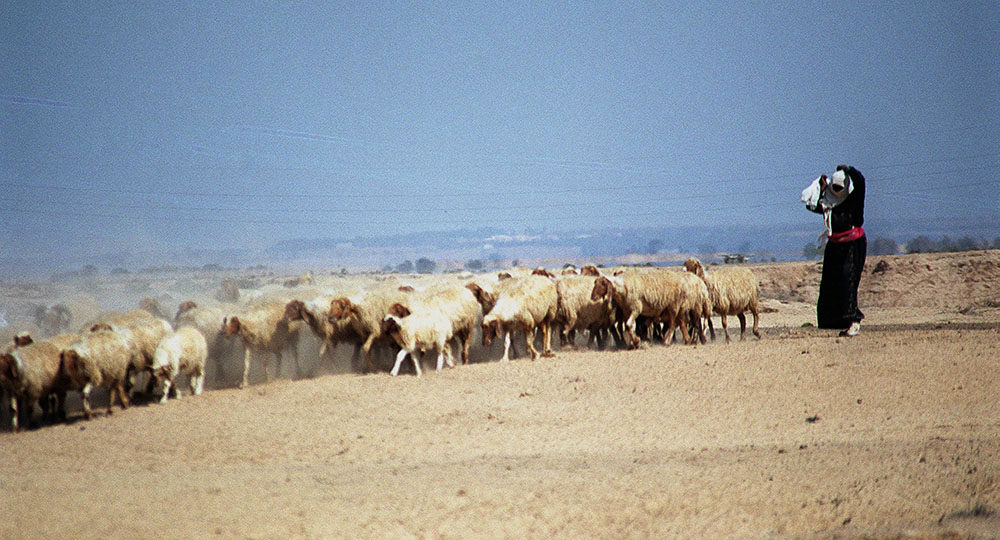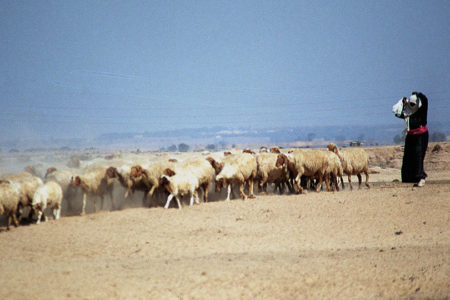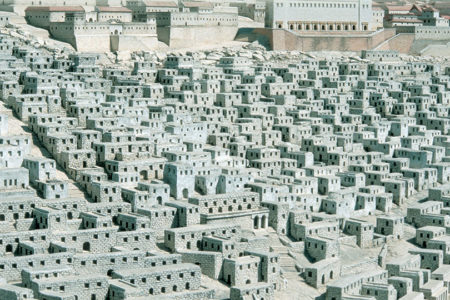The Root of Every Blessing: The Abrahamic Covenant
The word covenant is one of the most significant terms in Scripture. Used more than 300 times, it means simply an agreement between two parties, be they individuals or groups or nations.
There are many modern equivalents of a covenant. For example, a house purchase may involve a mortgage, which is a “covenant.” The buyer and lender enter into a contract that binds them to certain obligations.
Some covenants in the ancient Near East, such as treaties between a king and his subjects, were bilateral agreements, like mortgages. Others were one-sided or unilateral, such as land grants from a king to his subjects. A last will and testament is a modern example of a one-sided covenant, expressing only the wishes of the deceased.
It is this type of unilateral covenant that began God’s plan to bless the world. It is called the Abrahamic Covenant.
It’s Promises
In Genesis 12:1–3 the Lord made promises to Abram that involved three concepts: land, descendants, and blessing. First, God commanded Abram to leave his homeland of Ur (modern-day Iraq) for the land God would show him. This promised land is described later in Genesis.
Second, God promised Abram that he would become a great person and great nation. Though childless, Abram was promised a progeny.
Third, God promised that Abram would receive His blessing as well as mediate it to all the families of the earth. The focus on Abram is so central that God said, “I will bless them that bless thee, and curse him that curseth thee” (Gen. 12:3). This man became the unique channel of reciprocity from God. Cursing would come to those who treated Abram and his descendants with contempt; blessing would flow to those who treated them with favor.
Its Establishment
In Genesis 15:1–6 God repeated His promise that Abram would have descendants by comparing them to the uncountable stars. Abram expressed faith in God’s Word, which caused God to credit Abram’s faith as righteousness. (The apostle Paul quoted this passage in teaching the timeless truth of justification by faith [Rom. 4:3; Gal. 3:6]).
God then repeated His vow to give Abram the land of Canaan (Gen. 15:7–21), as promised earlier (12:7; 13:14–17), and here cited its natural borders: the river of Egypt (the Wadi el-Arish in the southeast) and the Euphrates River (in the northeast).
Abram then asked God to confirm this promise. So God told Abram to cut three animals in half (15:9–10). This custom enacted a solemn promise when those involved walked between the pieces of the animals.1 It pictured a self-curse: If the parties did not obey the covenant’s terms, their fate was to become like that of the slain animals.
In this covenant, however, Abraham did not walk between the pieces. God alone appeared as “a smoking furnace, and a burning lamp that passed between those pieces” (v. 17). These two symbols, like the cloud by day and fire by night in the wilderness, represent God Himself. He, and He alone, walked between the divided animals. God took upon Himself all the obligations of the covenant; and if they were not kept, the unthinkable would happen—God would die. But God cannot die. Therefore, He must keep His unconditional promises to Abram.
God reaffirmed His covenant with Abraham on three other occasions (Gen. 17:1–8, 21; 18:18–19; 22:15–18). God then passed it on perpetually to Abraham’s descendants, as confirmed to Isaac (Gen. 26:3–5, 24) and Jacob (Gen. 28:13–15; 35:9–12; 46:1–4).
As He told Abraham, “I will establish my covenant between me and thee and thy seed after thee in their generations for an everlasting covenant, to be a God unto thee, and to thy seed after thee” (Gen. 17:7).
Its Fulfillment
In the Nation of Israel
The three components of the covenant can be traced through the Scriptures.
Land. The land promised to Abraham formed the basis for the Exodus from Egypt: “And God heard their groaning, and God remembered his covenant with Abraham, with Isaac, and with Jacob” (Ex. 2:24). Moses led Abraham’s descendants out of Egypt; and Joshua led them into the Promised Land: “And the LORD gave unto Israel all the land which he swore to give unto their fathers, and they possessed it, and dwelt in it” (Josh. 21:43).
Under the reign of Solomon, the land was extended to the largest area possessed in ancient times (1 Ki. 4:21–24). Even though the Babylonian exile forced the Israelites from their land, they returned because of God’s promise to Abraham (Neh. 9:8). And though they were exiled again by Rome, the nation of Israel was reborn in 1948 and now inhabits part of its ancient homeland.
A brighter day is coming for that land of turmoil. The prophets foretold that Israel will be restored like the Garden of Eden (Ezek. 36:35) with fertility and peace (Amos 9:13–15).
Descendants. God’s promise of descendants from Abraham was realized in the Israelites who came out of Egypt (Ex. 32:13). The next generation entered the land; became a nation; and, by Solomon’s time, were “as the sand which is by the sea in multitude” (1 Ki. 4:20), a clear reference to the Abrahamic Covenant (Gen. 22:17).
In or out of the Promised Land, Jewish people are always considered the children of Abraham: “Ye are the sons . . . of the covenant which God made with our fathers, saying unto Abraham, And in thy seed shall all the kindreds of the earth be blessed” (Acts 3:25).
Every Jewish person is living proof that God still keeps His promise to Abraham. Every attempt to persecute or eliminate the chosen line of Abraham is an attack against God and His eternal covenant. Despite Satan’s attempts to destroy the Jewish people, God will preserve them. A peaceful day is coming for this people, for their prophets envisioned a future gathering to the land of Israel when they will seek God and live in safety (Zech. 10:8–12).
Blessing. The promised blessing to and through Abraham is illustrated in the account of Abimelech, king of Gerar (Gen. 20). While Abraham journeyed in Gerar, he feared that Abimelech would kill him in order to take his wife, Sarah. As a defense, he lied and said Sarah was his sister.
Although Abimelech did not knowingly steal another man’s wife, God implicated him, disciplined him, and threatened him with death if he did not return Sarah. In the end, Abraham took back his wife, prayed for Abimelech, and received payment from him. Abraham told the lie, but God protected him by the covenant. Abimelech “cursed” Abraham and was cursed; he then blessed Abraham and was blessed.
Throughout history God has desired to bless His Chosen People Israel and, through them, all the world. However, God’s desire did not come to pass because Israel failed to obey Him and instead experienced His judgment.
But God, in His faithfulness to the covenant, has not rejected Israel. One day the nation will be restored to Him through the New Covenant (Jer. 31:31–34) when Messiah Jesus returns (Rom. 11:25–27). Then Israel will enjoy God’s blessing and will lead all nations in worshiping the true God (Isa. 2:2–3). Israel’s future kingdom will last a thousand years (the Millennium) and then usher in the New Heavens and New Earth.
In the Church
Jesus, the Seed of Abraham. God’s promises in the Abrahamic Covenant find fulfillment in the person and work of Jesus, the Messiah of Israel. Until His coming, the promises could never achieve their full realization.
When Mary learned she would bear the Messiah, she praised God for giving help to “his servant, Israel, in remembrance of his mercy; As he spoke to our fathers, to Abraham, and to his seed forever” (Lk. 1:54–55).
Zacharias the priest, father of John the Baptist, likewise tied Jesus’ birth to the Abrahamic promises providing “the mercy promised to our fathers, and to remember his holy covenant; The oath which he swore to our father, Abraham” (Lk. 1:72–73).
The apostle Paul confirmed that Jesus came to fulfill the Abrahamic promises, not only for the Jews but also for Gentiles:
Now I say that Jesus Christ was a minister of the circumcision for the truth of God, to confirm the promises made unto the fathers [Abraham], And that the Gentiles might glorify God for his mercy (Rom. 15:8–9).
The New Testament thus expands the fulfillment of the Abrahamic Covenant to include both Jewish and Gentile Christians. Paul stated that the seed of Abraham consists of all believers: “And if ye be Christ’s, then are ye Abraham’s seed, and heirs according to the promise” (Gal. 3:29; cf. Rom. 4:11–12, 16). The blessings of the Abrahamic Covenant are available in the gospel of the Lord Jesus Christ:
And the scripture, foreseeing that God would justify the Gentiles through faith, preached before the gospel unto Abraham, saying, In thee shall all nations be blessed (Gal. 3:8).
The Abrahamic Covenant is actually the gospel in advance! The good news, or gospel, consists of God providing the blessing of justification to Gentiles who believe in Jesus, who is the seed of Abraham, “the son of Abraham” (Mt. 1:1; Gal. 3:16).
The Holy Spirit. Another blessing Christians receive is the Holy Spirit:
Christ hath redeemed us . . . That the blessing of Abraham might come on the Gentiles through Jesus Christ, that we might receive the promise of the Spirit through faith (Gal. 3:13–14).
This down payment of the Spirit will find full expression in God’s future Kingdom when we will possess new bodies and be free of sin forever, serving our Savior and Lord.
But Not the Land. There is no fulfillment of the land promise in the church. The church is never given a land; the land is promised to Israel alone.
Christians have always been a remnant within every nation, from Roman times until today. Believers exist in every land as witnesses to the spiritual blessings that flow to Gentiles from God’s covenant with Abraham. Before Jesus, Gentiles were “aliens from the commonwealth of Israel, and strangers from the covenants of promise, having no hope, and without God in the world” (Eph. 2:12).
But Christians are no longer strangers to the covenants. They are grafted in through faith in the Jewish Messiah. Thus Paul urged Roman Christians to contribute to needy Jewish believers in gratitude for the blessings of salvation that came to them via Jesus: “For if the Gentiles have been made partakers of their spiritual things [Abrahamic Covenant blessings], their duty is also to minister unto them in carnal [material] things” (Rom. 15:27).
This present, spiritual fulfillment of Abrahamic promises to all Christians in no way negates God’s promises to the nation of Israel. When Jesus returns to earth, the Jewish people will continue as a people; they will obtain the land of Israel; and they will both receive and channel God’s blessing to the nations.
Listen to the encouraging words of the prophet Isaiah:
Look unto Abraham, your father, and unto Sarah, who bore you; for I called him alone, and blessed him, and increased him. For the LORD shall comfort Zion; he will comfort all her waste places, and he will make her wilderness like Eden, and her desert like the garden of the LORD (51:2–3).
ENDNOTE
- In Gen. 15:18 the Hebrew for “made a covenant” is “cut a covenant,” a reference to the act of cutting the animals. The only other reference to it is Jeremiah 34:18–20.








Been blessed and insight
God bless you more
Dear Pastor Krewson. Knowing my interest in Israel, The Baptist Chapel where I worship asked me to lead some bible studies on Israel and God’s promises. (No small thing to do as I’ve never led before) I naturally started with Abraham and making my way through. The Lord directed me to your page and I have found it extremely useful in summarising not only where we have got to but also filling in some of the blanks. Eg. Abraham dividing the 3 sacrificial animals. Thank you for your work and may the Lord continue to bless you.
I praise God for you, Pastor Krewson!
May God continue to shine His face upon you and bless you and strengthen you to teach the uncompromised Gospel of Jesus Christ!
Thank you Pastor Krewson: you have brought me in-depth understanding in the Abrahamic Covenant. Thank you!
Abraham wasn’t the “unique channel of reciprocity” from God. As stated in Acts 3:35 it was a covenant made with the forefathers, who were Abraham, Isaac and Jacob. Genesis 17:7 confirms this when God said the covenant was to Abraham AND his seed. Hebrews 11:9 confirms that it was made also with Isaac and Jacob as does Hebrews 7:10. Yet I guess thwere’s not a better name for it since it’s the traditionnally accepted title
Thank you for your insight.
Blessings